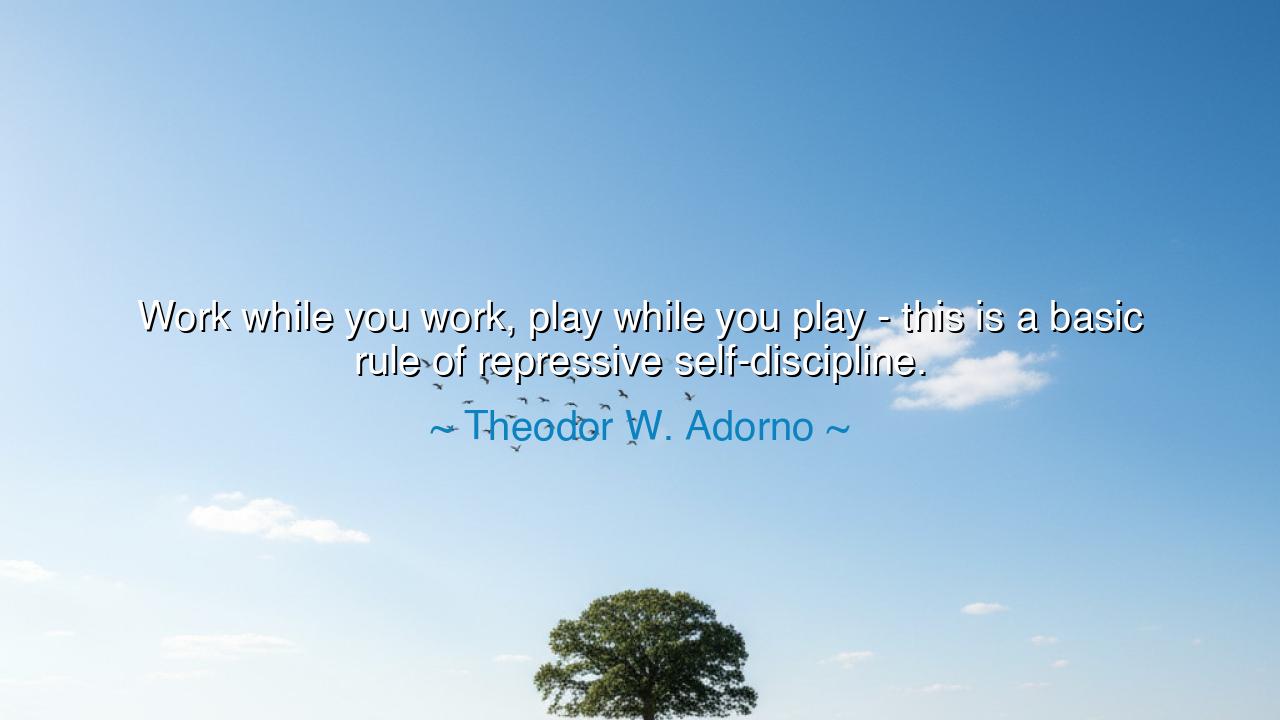
Work while you work, play while you play - this is a basic rule
Work while you work, play while you play - this is a basic rule of repressive self-discipline.






In the rhythm of life, there exists a harmony that must be honored, for the soul thrives in balance between effort and repose. Theodor W. Adorno speaks to this ancient truth when he declares, “Work while you work, play while you play — this is a basic rule of repressive self-discipline.” These words remind us that human labor and leisure are not to be mingled carelessly. To commit wholly to one moment, whether of toil or of joy, is to respect the integrity of each and to cultivate mastery over oneself.
To work while you work is to immerse oneself fully in the tasks of life, to summon every ounce of skill and attention to bear upon the matter at hand. Adorno’s insight is that discipline is not merely adherence to external rules, but the cultivation of internal focus. When the mind is given over entirely to its duty, the labor becomes both efficient and ennobling, transforming even the humblest task into a testament of purpose.
To play while you play is equally sacred. The ancients understood that joy, laughter, and the freedom of spirit are not distractions, but nourishment for the soul. By immersing oneself fully in recreation, one restores the mind and spirit, preparing them to return to work with renewed energy. The lesson is one of balance: neither duty nor pleasure should be half-heartedly experienced, for each holds its own power when approached with total presence.
Yet Adorno calls this repressive self-discipline, for it demands a rigor that is not always natural or easy. To govern oneself with such strict division of attention is a subtle mastery over desire and impulse. It is a discipline that curbs the wandering mind, training the soul to honor the boundaries between effort and enjoyment. Through this disciplined engagement, life achieves a rhythm that nourishes both purpose and delight.
Thus, let this teaching endure: immerse yourself fully in each moment, whether of work or of play, and guard the sanctity of both. The practice of repressive self-discipline is not a burden, but a path to harmony, teaching that the human spirit flourishes when labor is complete and joy is untroubled. In such mastery lies wisdom, and in wisdom, the peace of a life well-lived.






DHDuong Hoang
It’s a thought-provoking quote, but I wonder if it applies to everyone. Some people thrive on structure, while others feel stifled by it. Is the rule of separating work from play really the best way to live, or is it too rigid for modern life? Wouldn't it be better to find a way to blend work and leisure in a way that feels natural, rather than creating a boundary that might only lead to stress?
MDLe minh dc
Reading this quote made me think about how society encourages hustle culture. Adorno's quote seems to hint that maybe we're too obsessed with productivity, which can hinder our ability to truly relax or enjoy life. How many of us feel guilty about resting or playing? Could Adorno’s message be a reminder to find freedom in letting go of this over-reliance on self-discipline?
HMngo ngoc hoang minh
Adorno's perspective seems to come from a place of discipline, but in today’s fast-paced world, can anyone really live this way? Is it even possible to compartmentalize everything we do? Work bleeds into personal life constantly, and I wonder if that’s always a bad thing. Do we even have the luxury to separate these two aspects of life anymore, or has the world evolved to the point where they need to be integrated?
BQLe Bao Quyen
I see the logic in Adorno's quote, but it's hard to imagine living a life with no overlap between work and play. Could this kind of self-discipline lead to more fulfillment, or would it just make life feel too mechanical and dull? It's a tough balance to strike. How do others find that separation? Does anyone really have a clear divide between their work and personal life without feeling like they're constantly switching gears?
L825-Tran My Phuong Lop 8.13
I find Adorno's idea intriguing but also a bit restrictive. Shouldn't work and play be able to coexist? In my experience, work doesn't always feel like work if you genuinely enjoy what you're doing. And isn't it the same with play? Could it be that this 'repressive self-discipline' he mentions could prevent us from finding joy in both? Or, maybe the key is in balancing both effectively instead of rigidly separating them?